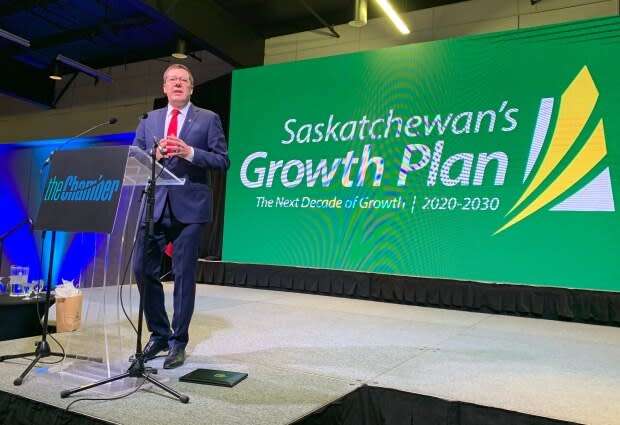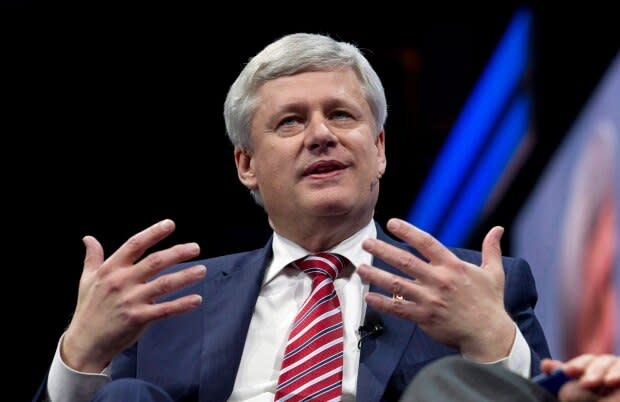Province's growth plan includes increasing Sask. population and oil production, new overseas trade offices

The Saskatchewan government has released its 10-year plan to grow the province's population and economy.
The growth plan includes goals of increasing the population by 226,000 and creating 100,000 more jobs by 2030.
"Growth allows us to help and protect the most vulnerable among us," Moe said. "Growth enables us to provide opportunity for young people so they stay in Saskatchewan."
Premier Scott Moe shared the details of the plan, which he teased in the fall throne speech, at a Saskatoon Chamber of Commerce event Thursday morning.

Saskatchewan's population is now 1.174 million, according to the most recent Statistics Canada estimates. In 2012, the Saskatchewan Party government announced a growth plan that aimed for 1.2 million people by 2020.
"Growth will afford the ability to invest in a better quality of life for Saskatchewan families and communities," Moe said.
The province's plan includes 30 goals for 2030. Aside from population and job growth, those include:
Increasing exports by 50 per cent.
Increasing agriculture value-added revenue by $10 billion.
Growing agri-food exports by $20 billion.
Increasing oil production to 600,000 barrels a day.
Tripling the Saskatchewan tech sector.
Reducing surgical wait times to a three-month target.
Province partners with former Prime Minister Harper
Another new initiative revealed in the plan is the revival of international trade offices in Japan, India and Singapore.
In an effort to increase trade by 50 per cent in the next decade, the provincial government will also be hiring Harper and Associates, the consulting firm of former Prime Minister Stephen Harper.
"We expect that Prime Minister Harper is going to help us increase our exports to the more than 150 countries where we do business each and every day," Moe said.
In 1991, the NDP government closed three international trade offices in Hong Kong, Minneapolis and Zurich.
The offices are meant to establish a stronger Saskatchewan presence in key trade areas, Moe said. Costs are expected to be announced when the offices are open, Moe said.
"Saskatchewan is a world class exporter and a powerhouse in our confederation," Stephen Harper said in a statement. "Its people and products can compete and win at home and around the world."
The government is paying Harper and Associates $240,000 for the contract.
Harper is headed to India with Saskatchewan Minister of Trade Jeremy Harrison this week.

The government also plans to reinstate cancelled provincial sales tax exemptions for exploratory and downhole drilling. The government said it is hoping the change will "increase mining exploration and the value of mining exports." Moe said the taxes need to be competitive.
"We heard from the industry — that the PST changes brought in were putting a damper on exploration," Moe said. "We're hopeful and we know that this policy change will encourage more exploration."
Meili agrees with international trade offices, questions population readiness
Opposition NDP leader Ryan Meili said growing the population would be a positive step for the government, but that the key is making sure the province can handle it.
"It's not just about more people, it's about making sure that people's lives are good in the province. Where are the children of those 1.4 million people going to go to school?" Meili said.
"We need to make sure that we understand that fundamental foundation of that growth is the people of the province."

Meili said he would focus more on the success of people, better health care, film and cultural sectors. He said Moe didn't mention opportunities for renewable energy sources like wind and solar. He also said more contracts should go to local workers instead of outside corporations.
Meili said he agreed with Moe's plans to open international offices and add more revenue to the current commodities through processing locally.
'Small business is big business' said Moe
Moe said more people need to know what's going on in Saskatchewan's.
"For example, more people in this province and nation should know about Verdient Foods in Vanscoy," Moe said. "Two years after that announcement, I'm still amazed that there are people that don't realize the size of the investment that they have made here."
Moe said that by cutting regulatory burdens, his government can increase small business in the province. Moe said they have done red tape reductions so far but they can do more.
He said he plans to appoint a business advisory panel to inform the province's red-tape reduction committee, which informs the government on what the industry wants in terms of regulations.
"We want people to start a business, and we want them to grow a business here."
Moe said there has been no better time to start a business.
"In this province, small business is big business," Moe said.


